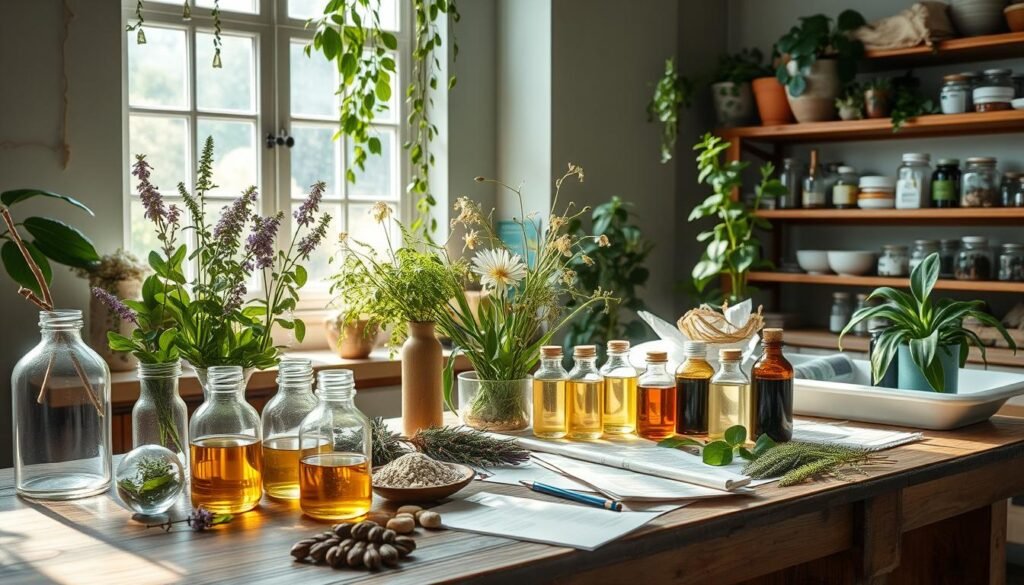More than 40 million U.S. adults struggle with anxiety each year. This shows a big need for better treatments. Many are now choosing herbal and natural meds over traditional ones. These plant-based options offer a whole-body way to handle anxiety. They let people find solutions that fit their wellness goals and ways of living. As concerns over the side effects of regular meds grow, the interest in natural methods is also increasing. These methods have been around for hundreds of years.
Key Takeaways
- Anxiety disorders affect over 40 million adults in the U.S. annually.
- Natural anxiety medications offer a holistic approach to manage anxiety.
- Herbal remedies are becoming a popular alternative to conventional medications.
- Assessing the safety of herbal supplements is crucial, especially during pregnancy.
- Each herbal solution, like chamomile and lavender, offers unique benefits.
- Consulting healthcare professionals is recommended when combining herbal and conventional therapies.
Understanding Anxiety Disorders
Millions in the United States face anxiety disorders each year. Understanding the prevalence of anxiety and its types is key. It helps us find effective management strategies. Knowing the signs and symptoms of anxiety disorders is crucial. It allows for quick interventions and better well-being.
Prevalence of Anxiety in the U.S.
Every year, more than 18% of Americans deal with an anxiety disorder. Throughout their lives, up to 30% will encounter these challenges. The high prevalence of anxiety shows we must address this issue with urgency. Even with available treatments, many seek herbal or natural remedies. They look for alternatives or supplements to conventional therapies.
Types of Anxiety Disorders
Knowing the types of anxiety disorders can guide us to the right treatment. Major categories include:
- Generalized Anxiety Disorder (GAD)
- Social Anxiety Disorder
- Panic Disorder
- Specific Phobias
- Obsessive-Compulsive Disorder (OCD)
Each disorder presents unique challenges. Understanding them is a crucial step toward effective management. Herbal supplements have shown positive outcomes in studies. These supplements help with various anxiety disorders. Those affected might explore these options further. For more insights on spotting anxiety symptoms, visit this resource.
Exploring Herbal and Natural Anxiety Medications
Many people are choosing herbal and natural options for anxiety relief. This is because they worry about the side effects of regular drugs. Herbal Anxiety Remedies are becoming popular due to their gentler effects.
Definition and Importance
Herbal anxiety medications come from plants. They help reduce anxiety symptoms. Herbs like Kava and Passionflower are well-known for their anxiety-reducing abilities. They also help people sleep better.
Benefits of Using Natural Remedies
Choosing herbal treatments for anxiety offers several advantages:
- Fewer side effects: Compared to traditional medicines, herbal options often have less severe side effects and lower addiction risks.
- Promotion of relaxation: Remedies such as Chamomile and Valerian Root are effective in promoting rest and improving sleep.
- Overall wellness: A healthier lifestyle, with good food and exercise, can boost the benefits of these remedies.
- Complementary use: Using Herbal Anxiety Remedies alongside other therapies can lead to better results.
Studies back up the effectiveness of Natural Anti-Anxiety Herbs. Kava, for example, is praised for reducing anxiety. Passionflower could raise GABA in the brain, aiding better sleep and less anxiety. Valerian Root is known for calming nerves, thanks to its impact on GABA.
With an eye on alternatives to standard treatments, herbal remedies offer new hope for those dealing with anxiety.
Common Herbal Remedies for Anxiety
Many people find relief from anxiety through herbal remedies. These natural options offer comfort from the earth’s gifts. Each one has unique benefits and risks worth considering.
Kava: Uses and Risks
Kava may help people relax and feel less anxious quickly. However, it can harm the liver if used too much or for too long. It’s crucial to talk to a doctor before trying kava, to make sure the benefits outweigh the risks.
Passion Flower: Potential Benefits
Passion Flower is known for its ability to soothe anxiety. It can be effective in the short term with fewer side effects than some drugs. Still, one must use it carefully to avoid problems like dizziness.
Valerian Root: Efficacy and Side Effects
Valerian Root is a well-liked solution for anxiety and sleep troubles. But not everyone agrees on how well it works. It might cause sleepiness and upset stomach if used too much. Researchers are still trying to understand how best to use it for anxiety.
| Herb | Benefits | Risks |
|---|---|---|
| Kava | Reduces anxiety symptoms quickly | Risk of liver damage with high doses |
| Passion Flower | Calming effects, fewer side effects than medications | Dizziness and possible interactions |
| Valerian Root | Supports sleep, mild anxiety relief | Drowsiness and digestive issues |
Natural Anti-Anxiety Herbs
Natural Anti-Anxiety Herbs are good for those seeking Plant-based Anxiety Solutions. They’re popular for their natural roots and lack of side effects. Let’s talk about three herbs known for their soothing effects.
Chamomile: Effects on Anxiety
Chamomile helps people with generalized anxiety disorder feel better. Its calming effects make it a top choice for natural relief. But, it might not mix well with blood thinners, as it could increase bleeding risk.
Lavender: Stress Relief through Aromatherapy
Lavender is known for making people feel calmer, both by smelling it and eating it. Studies show it’s good at lowering anxiety. But, it’s best to talk to a doctor before using lavender, especially for children and pregnant ladies.
Lemon Balm: Research and Safety
Lemon balm stands out for easing anxiety according to some recent studies. Even though it’s promising, we need more research on its safety. Adding lemon balm with other Herbal Anxiety Remedies could help you feel better overall.

| Herb | Benefits | Considerations |
|---|---|---|
| Chamomile | Reduces anxiety symptoms; promotes relaxation | Risk of bleeding with blood thinners |
| Lavender | Alleviates stress; improves mood | Safety concerns for children and pregnant women |
| Lemon Balm | Helps manage anxiety; enhances relaxation | More research needed on long-term safety |
Alternative Anxiety Therapies
Alternative Anxiety Therapies offer a new hope for those trying to manage their anxiety. They work alongside traditional treatments, improving your overall health. By using Cognitive Behavioral Therapy (CBT), mindfulness, and exercise, people can tackle anxiety in many ways.
Cognitive Behavioral Therapy (CBT)
Cognitive Behavioral Therapy is a respected psychological treatment. It aims to change negative thoughts. It’s proven to help with generalized anxiety disorder. Through CBT, people learn to recognize and correct untrue beliefs about their anxiety, leading to better coping strategies. For many, CBT is a key part of managing anxiety holistically.
Mindfulness and Meditation
Mindfulness and meditation are now popular for reducing anxiety. They help you stay in the moment, creating peace and awareness. Doing these practices regularly can greatly lower anxiety levels. Adding mindfulness to your day helps balance your emotions and supports using Anxiety Relief Supplements.
Exercise as an Anxiety Relief Method
Exercise is well-known for helping to decrease anxiety. Studies show it reduces anxiety symptoms by releasing endorphins and boosting mood. Whether you choose to walk, jog, or do yoga, it aids not just your physical health but your mental state too. Considering exercise as part of managing anxiety is vital for holistic mental health care.
| Therapy Category | Description | Benefits |
|---|---|---|
| Cognitive Behavioral Therapy (CBT) | Psychological treatment that focuses on changing negative thought patterns. | Effective for generalized anxiety disorder; fosters healthier coping mechanisms. |
| Mindfulness and Meditation | Practices that promote present-moment awareness and calmness. | Reduces anxiety symptoms; promotes emotional balance. |
| Exercise | Physical activity that supports overall health and mood enhancement. | Significantly lowers anxiety symptoms; improves mental well-being. |
Botanical Treatments for Anxiety
Botanical treatments for anxiety are getting a lot of attention as an alternative to traditional medicine. Many herbs have been shown to help with anxiety symptoms. It’s crucial to research these natural remedies and their effects.
While evidence supports the benefits of herbal solutions, we still need more scientific proof. This proof will help confirm how effective they really are.
Research on Herbal Efficacy
Research shows that some herbs help reduce anxiety. Lavender, for example, can be as helpful as some strong medications but is not addictive. Chamomile and lemon balm are also known for their ability to calm. The Safety of Herbal Remedies is very important because the quality of herb extracts can vary a lot. It’s critical to have strict testing to ensure people get a helpful amount.
Cautions and Considerations
When looking at botanical treatments for anxiety, we must consider potential drug interactions. Even though herbal remedies usually have fewer side effects than man-made drugs, they can still react with other medications. It’s important for individuals to talk to healthcare experts before starting any herbal treatments. This ensures their safety and prevents negative effects. In summary, botanical treatments are promising, but fully understanding their effects and safety is essential.

Combining Herbal Treatments with Conventional Medicine
Herbal treatments are becoming more popular. They are used alongside conventional medicine to manage anxiety. Many people seek out Non-Pharmaceutical Anxiety Aids, like herbal remedies. It’s important to know how these can mix with prescription medicines, especially for those already taking other medications.
Interactions with Prescription Medications
Herbal products may affect how prescription medications work. They can cause side effects or change a treatment’s effectiveness. The World Health Organization reports that 10 to 50% of people in developed countries use herbal products. It’s a growing trend that calls for caution. For instance, St. John’s wort, common for treating depression, can make many medications less effective. This includes antidepressants and birth control.
Consulting with Healthcare Professionals
Talking to healthcare providers before starting herbal treatments is crucial. Many who use herbal remedies don’t tell their doctors. This can increase the risk of negative reactions. Around 42% of Americans have tried at least one alternative medicine. Yet, less than 40% share this with their healthcare providers. Doctors can help make sure herbal treatments and prescription drugs work well together. They aim to improve health outcomes and reduce risks. There are many resources to support these conversations. They stress the need to educate both patients and healthcare teams about using herbal and conventional medicines together. For more details, reading about pharmacological interactions can be helpful.
Holistic Anxiety Management Strategies
Holistic Anxiety Management focuses on multiple areas, such as lifestyle changes and stress techniques. It also highlights nutrition’s role. These methods aim for a balanced life, which promotes emotional and mental health. Through different practices, people can manage their anxiety better.
Integrating Lifestyle Changes
Adding Lifestyle Changes for Anxiety Relief is key to controlling anxiety. Studies show that active people are 60% less likely to have anxiety symptoms. Physical activity not only keeps you fit but also lowers stress and anxiety.
Alcohol and smoking also affect anxiety. A 2019 study linked anxiety disorders with alcohol misuse, indicating that less drinking could improve mental health. Also, quitting smoking has been found to boost emotional wellness significantly.
Importance of Nutrition
Nutrition and Mental Health are connected, affecting mood and emotions. A balanced diet is crucial for mental health. Too much caffeine can increase anxiety and cause panic attacks in some people. Plus, sleeping at least 7 hours a night is critical for lessening anxiety symptoms, as the CDC suggests.
Eating foods with omega-3s, antioxidants, and vitamins helps with emotional health. A 2016 study showed chamomile could reduce anxiety symptoms in certain individuals. This shows how the right foods can positively affect mental health.
By focusing on holistic anxiety management, including lifestyle and dietary changes, people can support their emotional health. Recognizing the link between physical, nutritional, and mental health leads to lasting improvements.

Natural Calming Supplements: What Works?
Looking into natural calming supplements can help those with anxiety find relief without harsh side effects. Herbal teas and essential oils are effective options. They offer soothing properties for anxiety and stress relief.
Herbal Teas and Their Impact
Chamomile and lemon balm teas are known to ease anxiety. Drinking chamomile regularly might lower generalized anxiety disorder symptoms. It’s a top choice for natural relief. Peppermint tea also has a calming effect and keeps you hydrated. Below, compare some popular herbal teas:
| Herbal Tea | Benefits | Suggested Preparation |
|---|---|---|
| Chamomile | May reduce anxiety symptoms and promote sleep | Steep for 5 minutes in boiling water |
| Lemon Balm | Has a calming effect, especially during stressful situations | Steep fresh or dried leaves for 10 minutes |
| Peppermint | May help in reducing stress and tension | Steep leaves in hot water for 7 minutes |
Essential Oils: A Useful Addition
Lavender and jasmine essential oils can effectively lower anxiety. Inhaling these scents promotes relaxation and clarity. You can use essential oils in diffusers or baths for better results. Adding them to your daily habits supports emotional health.
The popularity of natural remedies is increasing as people seek anxiety solutions without conventional medication side effects. Understanding these supplements can help choose the best one for you. Always talk to a healthcare professional before trying new herbal remedies or supplements. For more on herbal supplement benefits, see this guide.
Conclusion
Using herbal and natural anxiety remedies is a hopeful option for managing anxiety. Nearly 40 million Americans deal with this mental health issue. Turning to natural solutions like Kava and Lavender can offer big benefits.
These natural methods are often easier to handle and have fewer side effects than regular drugs. But, it’s important to remember they might not mix well with other medicines. Mixing natural remedies with things like mindfulness and lifestyle changes can help a lot.
When thinking about trying these natural options, talking to a doctor is a smart move. This ensures a safe and smart way to tackle anxiety.
Learning about the natural options available, as shown in the summary of natural remedies, gives people power over their mental health. Being open to these methods could provide extra support needed to deal with anxiety.